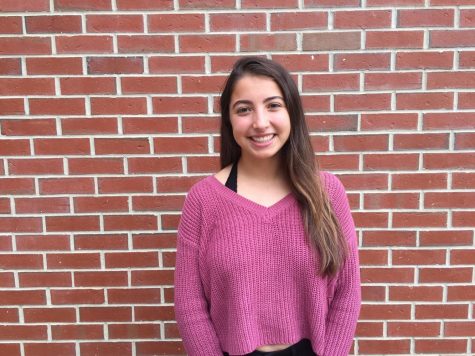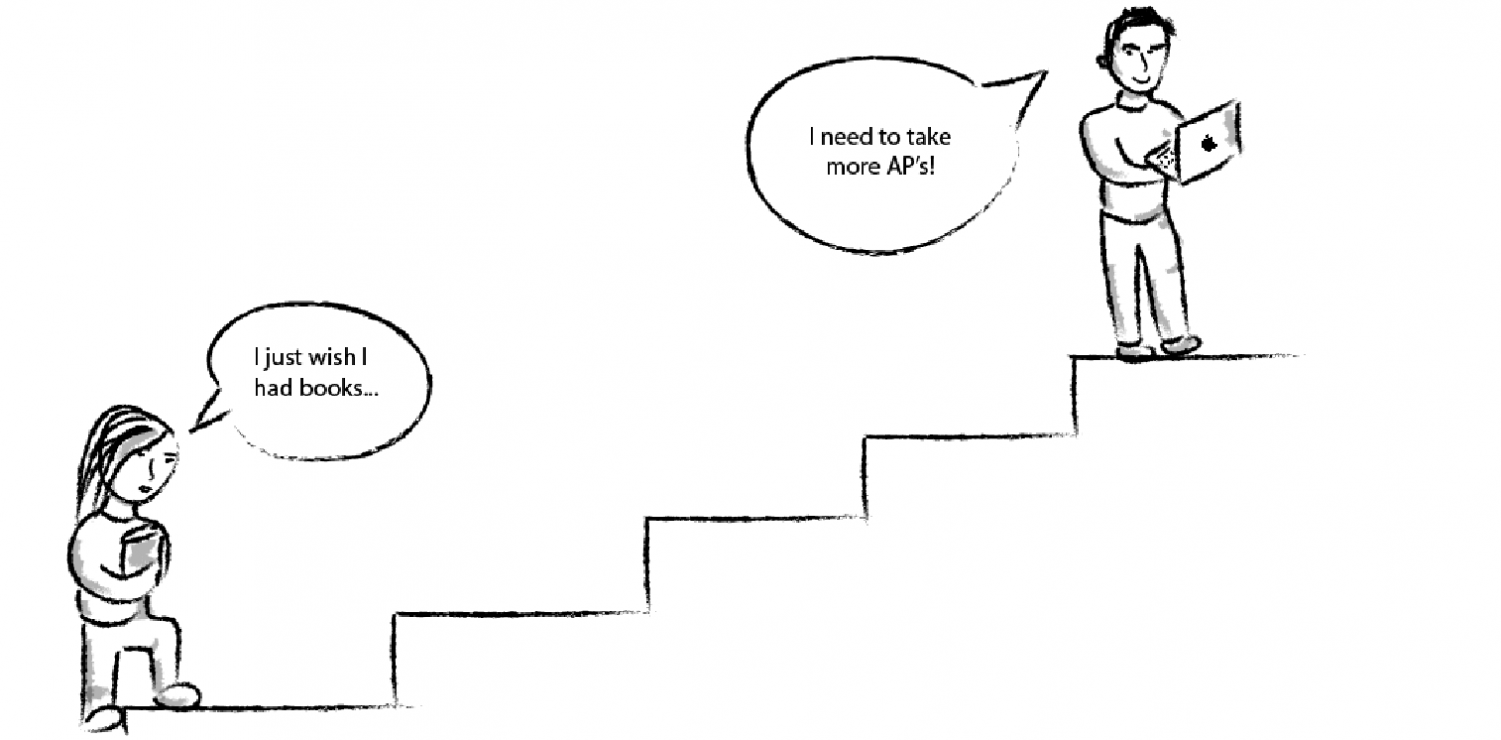The summer before senior year, senior Claire Duffy became overwhelmed by the daunting prospect of her upcoming college applications. With an entire future looming over her, she spent her days poring over essays and supplemental materials as she filled out 17 tedious applications, approaching 4 a.m. on countless Saturday nights.
“It’s like any time you have a second of free time, you think you should be home fixing your essay,” Duffy said. “I think the worst part is the overwhelming threat of uncertainty and feeling like you should have done more.”
Duffy is part of a growing subset of students who push themselves academically to the point where school work begins to take over their personal life through curricula largely comprised of Honors and AP classes. According to a study published by “Frontiers in Psychology” in July 2015, forty-nine percent of students surveyed reported feeling a “great deal of stress” on a daily basis, primarily stemming from grades, homework and college preparation.
“Either kids will break under the mounting pressure or something, but some change is going to have to be made,” Duffy said. “We can’t keep going on like this. As the pressure of college tends toward infinity, the limit has to exist, and eventually we will converge to a certain point.”
GETTING AHEAD
Many counselors and students think that the culture within some classrooms has shifted to become more competitive in recent years, oftentimes promoting the end goal of an acceptance letter from a prestigious university, according to guidance counselor Conor Brosnan and senior Nicole Saulnier.
“I do think there has been a bit of a cultural shift,” Brosnan said. “I think there is a group of students and families, that right when they step into this building, there’s one goal: to get into the best college, possibly best name, out there.”
“It’s the student culture,” Saulnier said. “It’s so competitive. Eighth grade teachers tell us to take the honors classes and to take the advanced classes in subjects that we are interested in. That’s what we should be doing, but that’s not how student culture is at all.”
Faced with competition in regards to curricula, test scores and extracurriculars, some students look for opportunities to “get ahead,” according to Duffy. This can manifest itself in the form of testing out of classes, taking half a year of a language or taking independent studies to fit in more AP classes.
“I took Physics last year as an opportunity to get ahead,” junior Xander Simon said. “I wanted to take as many of the required classes early so that I could have more space in my schedule in my later years of high school.”
Math Department Head Elizabeth Dore frequently sees students aiming to test out of classes.
“We do have a lot of students that do enrichment outside of class,” Dore said. “They go to [the Russian School of Mathematics], and they’re doing this so they can test out of classes. But our whole point is: Where are kids rushing to? What is the rush to skip these courses?”
The highest math course offered by Algonquin is AP Calculus BC. In advancing through classes at an accelerated rate, Dore says, some students reach a point where the school no longer offers the next-level course. Due to this, students are forced to take online classes, which Dore believes can have drawbacks.
“Nothing replaces having a human being answering your questions and the give and take that happens in classes,” Dore said.
According to Duffy, placing out of classes can potentially advance a student’s grade point average. She says she was not made aware of these options as an underclassman and that it may have affected the opportunities available to her.
“[Some students] can test out of classes and take more APs as a sophomore, which gives them an edge in terms of GPA and class rank,” Duffy said. “It’s frustrating to watch kids skip classes that you wish you could, but you can’t… That’s not to say it’s bad to take advantage of these opportunities. If I’d known about them, I certainly would’ve used them.”
However, because of this, she says, a GPA may not be the best indicator of a student’s full capabilities in every situation.
“Lots of people’s ranks didn’t necessarily reflect their achievements and efforts…” Duffy said. “They were lower to begin with because we didn’t have the opportunity to take classes to get in APs earlier.”
EXTERNAL FACTORS
The environment can often play a role in the stress students feel, according to counselors and students alike.
“Any time you have a high school that has very good academics, it’s going to breed competitiveness among the kids,” Brosnan said. “It breeds this idea that you need to get into this top-level school name-wise, and we have been trying really hard to get people to take what they are interested in and have balance in their schedules.”
“A lot of your work ethic comes from your environment,” Duffy said. “Obviously your success is determined by how hard you try in school, but the motivation to do well often comes from outside influences, including your family and peers.”
Additionally, financial concerns can play a large role in the opportunities that are accessible to a student.
“Monetary factors do play an important role in education,” Simon said. “Students with more money are able to go to private schools that are looked highly upon, get the best tutors to ensure they understand a topic, have the best resources to help them and have no other worries outside of school.”
Many argue that these economic factors create and foster an academic divide. According to the article “11 Facts About Education and Poverty in America” published by dosomething.org, 40 percent of students living in poverty are not prepared for primary schooling, and students 16 to 24 years old from low income families are seven times more likely to drop out than those from higher income families.
“Around the country and the world there are certainly places where students have a much greater advantage just by living in a better place and having access to a better education…” junior Amir Bagheri said. “Since I live in Northborough and go to Algonquin, I feel like I do have an advantage.”
While Duffy acknowledges that “some [students within the community] are more privileged than others,” she emphasizes that Algonquin’s standing as a top public high school opens many doors for students that others, even in nearby towns, may not have. Although she herself admits to agonizing over small details, she thinks the stress over these factors is perpetuated by attending a privileged school.
“This is purely an Algonquin issue because [some of us] have the money to go to good colleges,” Duffy said. “So we get caught up in who has what and who talks to [whom], because it affects which good college we go to.”
FINDING A BALANCE
According to Simon, the pressure to do well will “probably not fade anytime in the future.”
However, many students say that it is important to find ways to balance academic life with pursuing passions and experiencing the joys of adolescence .
“To be blunt, I don’t really care about what I learned or achieved in terms of academics over the course of high school since all the energy I devoted into it was just so I could get good grades…” Bagheri said. “However, I feel that the experiences and time I’ve had outside of high school academics are much more important, and I look at them with a much realer sense of fondness and appreciation.”
“It’s important to try to find the balance, and it’s hard to try to separate work and play, especially when you’re constantly stressed,” Duffy said. “You have to do it for your mental health… It can be hard to escape constant pressure to succeed, but you’ll waste away your high school years if you don’t.”
Furthermore, Simon feels that the overemphasizing of grades can detract from the goals of a classroom.
“The high school experience becomes less fulfilling when learning is put on the backburner, whereas the grades from the classes are pushed to the forefront,” Simon said. “This is detrimental in a school environment where the intent is to teach students.”
Brosnan maintains that the main purpose of education should be geared towards preparing students for independent life.
“The most important thing about education is teaching you guys how to think for yourselves, not necessarily just spit out facts,” Brosnan said. “It’s about being informed to form your own opinions, to know your rights, to become your own individual.”


